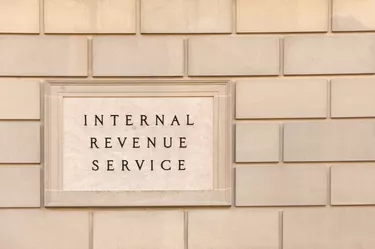IRS dependent fraud occurs when you knowingly claim someone as a dependent on your federal income tax return who does not qualify for that designation. People commit dependent fraud to reduce their taxes, which makes it a form of tax evasion. Tax evasion is a felony with potentially severe criminal penalties.

Video of the Day
Fraud vs. Negligence
Under the tax code, improperly claiming someone as a dependent rises to the level of fraud, and therefore tax evasion, only if you demonstrate "willfulness." That means you have to know that you're breaking the law to be guilty of fraud. Without willfulness, improperly claiming a dependent may be considered an act of negligence. Negligence can be penalized —- it's your responsibility to know the rules — but it's not a crime.
Video of the Day
Unpaid Tax and Late Penalties
Claiming someone as a dependent can reduce your tax liability in multiple ways. You get a dependent exemption for that person right off the top. Dependents also can make you eligible for various deductions and tax credits, such as for education expenses, medical bills and child care. If the IRS catches you claiming a bogus dependent, you'll have to pay the tax you avoided by doing so. If that dependent reduced your taxes by $3,000, for example, you have to pay that amount. Further, you must pay a late penalty of 0.5 percent of the unpaid amount for every month that had passed since the tax was due. A $3,000 tax, for example, would have a late penalty of $15 per month until you paid it.
Civil Penalties
In addition to late charges, the IRS can impose civil penalties. If the IRS concludes you claimed someone as a dependent improperly because of negligence rather than fraud — because you misunderstood the rules, for example — it can assess a civil penalty of 20 percent of your understated tax. However, if the IRS believes you committed fraud, it can assess a penalty of 75 percent of your understated tax. If you had the same $3,000 underpayment from the previous example, your civil penalty would be $600 for negligence, but $2,250 for fraud.
Criminal Penalties
To impose more than the 75 percent civil penalty for fraud, the IRS has to file criminal charges. If you're successfully prosecuted for tax evasion based on dependent fraud, you can be sentenced to up to five years in prison, fined up to $250,000 and ordered to pay the costs of prosecution. Alternatively, the IRS could charge you with perjury. When you file your tax return, you are swearing "under penalties of perjury" that everything in it is true. If convicted of filing a return with willfully false information, such as an improperly claimed dependent, you can be sentenced to up to three years in prison, fined up to $250,000 and made to pay the costs of your prosecution.